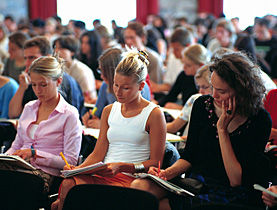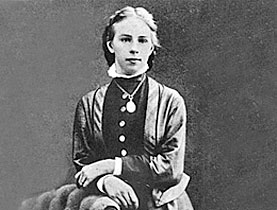Women academics still struggle to make professor

Although more than half of all students in Switzerland are female, very few make it to the academic heights of being a professor.
As International Women’s Day is celebrated this weekend, experts talk about how balancing work and family, a husband’s career and old-fashioned attitudes are holding women back. But they point out that the tide is slowly turning.
“When you start your academic career, you don’t have any idea of what it’s really going to be like,” said Brigitte Tag, professor of law at Zurich University. “It’s a big learning curve for a woman.”
But Tag, who started her career in Germany, feels well supported at Zurich University, which is trying to boost numbers of female professors.
They currently make up 15 per cent of full professorships – the Swiss average is 14 per cent. This compares with 56 per cent female students, and around 50 per cent women doctoral students.
The higher numbers of women studying should mean more having scientific careers in the future, says Tag.
Nevertheless even in women-dominated faculties, such as veterinary studies where women make up 80 per cent, there are very few female professors.
Work-life balance
Other factors come into play – and one of the biggest is combining family and work. The university, along with the Federal Institute of Technology and the Teachers’ Training College, has created 150 childcare places. But better care structures for babies are still needed.
“When an academic is out of the loop for a few years it is very hard to get back in because developments are so quick,” Tag told swissinfo.
The fact that Swiss schools tend to finish at lunchtime creates problems for working parents, as do academics’ evening duties.
Attitudes also need to change. “There’s still the notion that women are not best suited to being professors, which is pure prejudice and is now being banished into the past, but for a long time it was very present and there were very few role models,” Tag explained.
“The more women we have who are out there, giving lectures and having success at scientific conferences, the more this will change.”
Boosting change
Zurich University has been following the Swiss Federal Equal Opportunity at Universities Programme 2000-2011, aimed at boosting the number of women professors.
Apart from helping to increase childcare provision, there is funding given to universities to encourage the hiring of female professors. Institutions can hand out the money as they wish. At Zurich it helps new female professors in their research or conference participation.
Some voices have criticised the scheme as a way to earn extra money. Tag disputes this, saying that it has helped women build up their academic chairs, as has been confirmed by women professors at the university.
The one disadvantage is that hiring more women means each receives a smaller share of the budget, but this is a small price to pay, adds Tag.
Reaping the rewards
The Universities Programme is aimed at all ten cantonal universities.
“There was seven per cent female professors when we started in 2000. Our aim was to double this number, which we reached in 2006,” programme coordinator Gabriela Obexer-Ruff told swissinfo.
The numbers change according to domain, with the social sciences and law showing the highest proportions. Engineering and technology generally score lower.
Universities also differ. Doing well is the young Lucerne University, which specialises in social sciences, and the French-speaking part of the country, where there is strong political support for equality measures.
The European Union average is 15 per cent.
“We cannot prove that doubling the number of female professors is a causal effect of the programme, but at least discussion was started, also at the top levels,” Obexer-Ruff said.
One particular success has been the mentoring programme for junior researchers, the third part of the scheme. Tag also confirms good results at Zurich.
Another objective is to target dual academic career couples where priority is often given to the man’s career.
Loss of potential
“It’s a loss if we don’t use female potential,” said Obexer-Ruff, herself an academic with two children.
The programme is aiming for 25 per cent female professors by 2012, which Obexer-Ruff admits is very ambitious. A survey by the Federal Statistics Office predicts 19-25 per cent by 2016.
In the meanwhile, it is important for women not to be discouraged, to deal with setbacks and not to take things personally, says Tag.
“When you remain true to yourself and have a goal, you can come close to your goal,” she said.
swissinfo, Isobel Leybold-Johnson in Zurich
In the US and France women were allowed to study from 1833 and Zurich was the first German-speaking university to accept women as students with equal rights from 1864. But it took another 100 years before women gained the right to vote in Switzerland (1972).
Sophia Kovalevskaya (1850-1891) was Europe’s very first professor in 1884. The first with the right to examine candidates and sit on a university senate was Anna Tumarkin (1875-1951) at Bern University. Of Russian-Jewish extraction, Tumarkin was a philosopher.
Switzerland’s receptiveness to women as students has been explained by the fact that the social prestige of higher education was low. For a long time the social structure was dominated by the agricultural sector.
The figures now for women (2008): 43.9 per cent students in Switzerland, one of the lowest proportions of female PhDs at 36.9%, and 14% full professors.
The event was held for the first time in 1911 in Austria, Denmark, Germany and Switzerland, but it was made official after the United Nations declared March 8 International Women’s Day in 1975.
It aims to raise awareness of women’s issues as well as celebrate the economic, political and social achievements of women past, present and future.
IWD is now an official holiday in China, Armenia, Russia, Azerbaijan, Belarus, Bulgaria, Kazakhstan, Kyrgyzstan, Macedonia, Moldova, Mongolia, Tajikistan, Ukraine, Uzbekistan and Vietnam.

In compliance with the JTI standards
More: SWI swissinfo.ch certified by the Journalism Trust Initiative












You can find an overview of ongoing debates with our journalists here . Please join us!
If you want to start a conversation about a topic raised in this article or want to report factual errors, email us at english@swissinfo.ch.